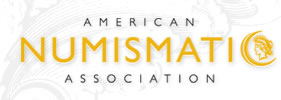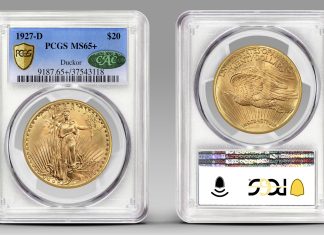 Four items from the famed Stack’s Family Library now call the ANA’s Dwight N. Manley Library home. Purchased from George Frederick Kolbe’s January auction in New York City, the ANA’s new American numismatic literature rarities include a rare large paper copy of the first work devoted exclusively to American coins and a complete set of the 19th-century numismatic journal Numisma.
Four items from the famed Stack’s Family Library now call the ANA’s Dwight N. Manley Library home. Purchased from George Frederick Kolbe’s January auction in New York City, the ANA’s new American numismatic literature rarities include a rare large paper copy of the first work devoted exclusively to American coins and a complete set of the 19th-century numismatic journal Numisma.
The Stack’s Family Library was assembled over seven decades by the New York numismatic firm founded by brothers Morton and Joseph Stack and carried on by their children. For more than fifty years, the library’s fabled American portion resided in antique bookcases lining two walls of Harvey Stack’s office.
Covering many aspects of numismatics and replete with rarities, the library’s sale was the most anticipated numismatic literature sale in recent memory and attracted bidders from around the world. The 400-lot sale marked only the second time a single-day numismatic literature auction grossed more than $1 million.
"We put a high priority on having a complete library collection, and are committed to upgrading and expanding it. When the opportunity arises, as it did during the Stack Family Library Sale, we took a serious look at adding rare and significant materials to the library," ANA executive director Larry Shepherd said. "We think the ANA library is a major asset for the whole numismatic community. By obtaining these items, we are preserving them and making them available to members and scholars for viewing."
The library won four lots in the sale, which were purchased using general funds from the ANA annual operating budget. All will be housed in the Frank J. Katen Rare Book Room, which is environmentally controlled to keep items in pristine condition.
Following are descriptions of each of the items purchased at the auction.
An Historical Account of American Coinage
John H. Hickcox’s 1858 work, An Historical Account of American Coinage (ANA Library Catalog No. GA40.H5), was the first to attempt a comprehensive history of U.S. coinage, and features five plates showing American colonial coins. The book is inscribed in ink on the front flyleaf: "M. L. Spooner, Troy, N. Y., April 12th 1968," and autographed below in blue ink by Morton Stack.
The ANA’s copy is one of five issued in a large format; 200 were printed in small size. Of these, four are typically thought to have survived to the present day, based on auction sales. However, according to an annotation found in another large paper copy and a note in an 1883 bookseller’s catalogue issued by Charles Lowell Woodward, at least one of the five copies issued had, at that early date, been "cut down" and another had been "burnt."
Hickcox’s groundbreaking work was a necessity for early generalists. Decades later, however, numismatic specialists found faults with the book; Hickcox’s reputation didn’t fare much better. From 1874 to 1882, he was employed in the Copyright Division at the Library of Congress. As Q. David Bowers writes in American Numismatics Before the Civil War, Hickcox’s "numismatic career came to an abrupt halt in 1882 when he was arrested for the crime ‘of opening mail letters and pocketing the money.’ Hickcox admitted his guilt. In March 1882, he was summarily relieved of his honorary membership in the American Numismatic Society."
Numisma
Author John W. Adams, in United States Numismatic Literature, Volume I, wrote that the 19th century magazine Numisma was "undoubtedly the most lively publication of its kind, it provides us with an intimate glimpse into the hobby as it and its personalities then existed."
Numisma was published by editor and cataloger Ed Frossard. The first nine volumes were published bi-monthly but the final volume was issued over a five-year period. This periodic schedule along with printing on inferior-quality paper may be a reason fewer than a dozen sets are currently known to be extant. The ANA’s copy includes all 59 issues but is missing a four-page supplement issued to accompany the January 1884 issue. It also includes a useful six-page index written in pencil in the back of the bound volumes. This copy may have belonged to former ANS President Benjamin Betts, as evidenced by "B. Betts" written in pencil on the front flyleaf.
In the pages of Numisma, Frossard dished out opinions, offering praise to some and tonguelashings to offending competitors. In the last Numisma issue, December 1891, Frossard includes an item about a fledgling group of collectors called the American Numismatic Association.
"This lately founded association aims at becoming a medium of intercommunication between collectors in all sections of this vast country. … The future of this association is bright with promises of widely reaching usefulness and success," he writes.
Historical Sketches of the Paper Currency of the American Colonies
Historical Sketches of the Paper Currency of the American Colonies, Prior to the Adoption of the Federal Constitution and Historical Sketches of American Paper Currency (ANA Library Catalog No. US40.P5a V. 1 & 2), written by Henry Philips Jr. in 1865 and 1866, respectively, are bound into one volume. The first volume consists of monographs on the colonial paper money of Pennsylvania, New Jersey, Virginia and Vermont, along with a reprint of Elisha Potter’s work on Rhode Island. The second volume compresses Phillips’ work on continental paper money.
Thomas Elder catalog
Elder’s work in numismatics started with an advertisement in 1899 and ended with his death in 1948. A passionate collector and commercial success, Elder released nearly 300 catalogs, starting in 1903 and ending in 1940. The ANA has 236 of the 294 Elder catalog dates in its collection. "We know of only one complete set (of Elder catalogs) — the author’s own — and it has disappeared into the mists of time," Adams writes.
The catalog of Thomas Elder’s 21st sale, conducted Oct. 5-7, 1908, documents the rare coins collection of James B. Wilson. It was a notable sale of American coins, especially important for large cents.
Elder called the collection the finest ever sold at auction, and notes that "most of these choice pieces were purchased by Mr. Wilson at the Frothingham sale in May, 1883. Several are from the Parmelee collection."
The catalog’s fine photographic plates show some delightful illustrations: Eight of the plates illustrate large cents; three plates depict United States gold coins; there are four plates of silver dollars, two of halves and one each of quarters and dimes; two plates depict pattern silver dollars and ten early half dimes; three plates illustrate ancient, medieval and modern foreign coins; and four plates depict pioneer gold rarities.
To find out more about these books, visit www.money.org and click on "Library" under the Explore the World of Money scroll-down menu. From here, search the library catalog for "Stack Family Library," and you’ll find full auction catalog lot descriptions of new ANA Library materials from this sale. In the coming years, the ANA library staff hopes to digitize these materials, making them available on the online catalog with the click of a mouse.
About American Numismatic Association
The American Numismatic Association is a nonprofit educational organization dedicated to encouraging people to study and collect money and related items. The ANA helps its 32,000 members and the public discover and explore the world of money through its vast array of education and outreach programs, as well as its museum, library, publications, conventions and seminars. For more information, call 719-632-2646 or visit www.money.org.






I have a 1941 “s” penny which was struck several several times. There are parts of wheat leaf on the front with Lincoln, and several wheat leaves on the obverse of the coin. How and where can I get it safely appraised?
Thanks
I have a 1941 “S” penny which was struck several times in the mint. There are parts of the wheat leaf and “ONE CENT” on the Lincoln side and around 15 stamps of the wheat leaf on the obverse of the coin. How can I get this safely appraised>
Thanks
Steve Starr